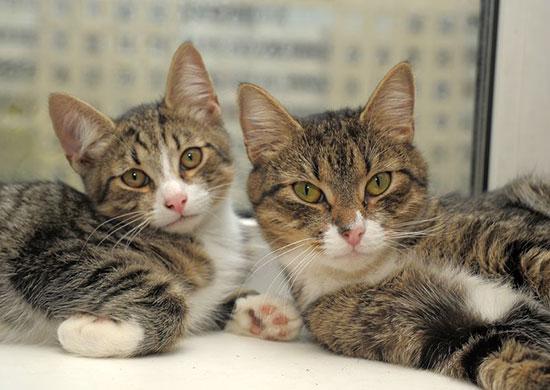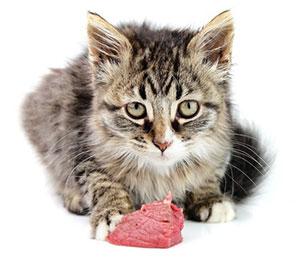This content is archived from the Feline Nutrition Foundation
Lysine and Raw Cat Food Diets
- Updated: Saturday, June 01, 2019 05:30 PM
- Published: Saturday, March 07, 2015 05:49 PM
- Written by Elisa Katz, DVM
 What is lysine? I have a friend who gives it to her cat as a treatment for herpes, but should it be supplemented in every cat's diet?
What is lysine? I have a friend who gives it to her cat as a treatment for herpes, but should it be supplemented in every cat's diet?
Lysine is an essential amino acid for cats. This means that the cat's body cannot synthesize or make this amino acid; it must be consumed in the diet. It is present in all meats, but fish contain higher amounts than other types of meat. For many years in human medicine, lysine has been used to help suppress herpes flare-ups as several studies exist to support this.¹ It is suspected that the mechanism by which it is able to suppress herpesvirus is by competing with arginine. Studies have indicated that arginine is necessary to signal and initiate replication of certain viruses including all herpesviruses. It is thought that lysine displaces arginine and thus interferes with this process. Several studies indicate that it may be effective at suppressing feline herpesvirus, a common cause of upper respiratory and eye problems in cats.²
 As arginine is also an essential amino acid for the cat, there has been some concern that too much lysine may result in an arginine deficiency. Arginine deficiency can make cats very sick. See "Arginine: Essential and Abundant for Cat Nutrition" for more information on that. However, a 2004 study of 36 cats concluded that lysine supplementation of up to 86 g/kg showed no adverse effects.³ This would equate to the average 4.5 kg, or 10 pound, cat receiving 387 g or 387,000 mg per day. Given that the recommended treatment dose is 500 mg twice daily, there seems to be no cause for concern regarding arginine deficiency in cats appropriately supplemented with lysine. While the study covered a 14-day period, it can be assumed that due to the enormous difference between the threshold of lysine resulting in any adverse effect and the typical dose, long-term usage is extremely unlikely to result in any unwanted effects.
As arginine is also an essential amino acid for the cat, there has been some concern that too much lysine may result in an arginine deficiency. Arginine deficiency can make cats very sick. See "Arginine: Essential and Abundant for Cat Nutrition" for more information on that. However, a 2004 study of 36 cats concluded that lysine supplementation of up to 86 g/kg showed no adverse effects.³ This would equate to the average 4.5 kg, or 10 pound, cat receiving 387 g or 387,000 mg per day. Given that the recommended treatment dose is 500 mg twice daily, there seems to be no cause for concern regarding arginine deficiency in cats appropriately supplemented with lysine. While the study covered a 14-day period, it can be assumed that due to the enormous difference between the threshold of lysine resulting in any adverse effect and the typical dose, long-term usage is extremely unlikely to result in any unwanted effects.
Additional Reading
Answers: Kitty That Only Wants Fish
The Case Against Cod Liver Oil
According to the National Research Council, the minimum daily requirement for an adult cat is 0.68 g per 1,000 kcal of metabolizable energy.⁴ Since most cats require in the range of 300-350 kilocalories per day, the minimum requirement for most cats should be about 0.20-0.25 g, which is 200 to 250 mg and equivalent to 0.0088 ounce. The NRC does not list a maximum daily amount. Most meat sources, including poultry, beef and fish, have at least 230 mg of lysine per 100 grams/3.5 ounces of meat. Since most cats will consume at least 4 ounces of meat per day, there is more than enough in a raw meat-based diet to meet a cat's daily need.⁵
Note: Feline Nutrition provides feline health and nutrition information as a public service. Diagnosis and treatment of specific conditions should always be in consultation with your own veterinarian. Feline Nutrition disclaims all warranties and liability related to the veterinary advice and information provided on this site.
Dr. Elisa Katz, DVM, is a graduate of Ohio State University and is the owner of Natural Pet Animal Hospital in Bourbonnais, Illinois. She practices holistic and integrative medicine focusing on proper diet and nutrition. Dr. Katz shares her home with four kitties and one dog.
1. RS Griffith, AL Norins and C Kagan, "A Multicentered Study of Lysine Therapy in Herpes Simplex Infection," Dermatologica 156, no. 55, 1978, 257-267.
RS Griffith, DE Walsh, KH Myrmel, RW Thompson and A Behforooz, "Success of L-lysine Therapy in Frequently Recurrent Herpes Simplex Infection. Treatment and Prophylaxis," Dermatologica 175, no. 4, 1987, 183-190.
2. DJ Maggs, "L-Lysine Administration for Feline Herpes Virus Infection," Clinician's Brief, July 2008, 39-41.
DJ Maggs, "Effects of L-lysine and L-arginine on In Vitro Replication of Feline Herpesvirus Type-1," American Journal of Veterinary Research 64, no. 12, 2000, 1474-1478.
J Stiles, WM Townsend, QR Rogers and SG Krohne, 2002, 'Effect of Oral Administration of L-lysine on Conjunctivitis Caused by Feline Herpesvirus in Cats," American Journal of Veterinary Research 63, no. 1, Jan 2002, 99-103.
3. AJ Fascetti, DJ Maggs, ML Kanchuk, HE Clarke and QR Rogers, "Excess Dietary Lysine Does Not Cause Lysine-Arginine Antagonism in Adult Cats," Journal of Nutrition134, 2004, 2042S-2045S.
4. SL Sanderson, "Nutritional Requirements and Related Diseases of Small Animals," National Academies Press, 2013.
5. USDA National Nutrient Database for Standard Reference, Release 28, September 2015.




